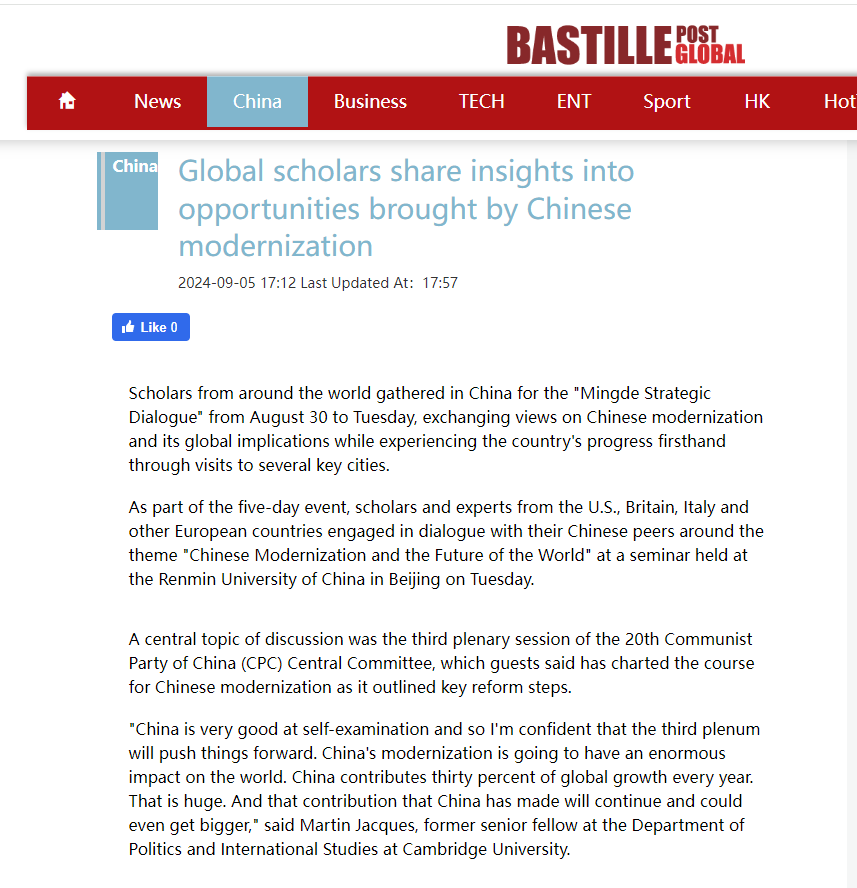LATEST INSIGHTS
Your Present Location: LATEST INSIGHTS[Bastille] Global scholars share insights into opportunities brought by Chinese modernization
Source: Bastille Post Global Published: 2024-09-05

By Bastille Post Global
Scholars from around the world gathered in China for the "Mingde Strategic Dialogue" from August 30 to Tuesday, exchanging views on Chinese modernization and its global implications while experiencing the country's progress firsthand through visits to several key cities.
As part of the five-day event, scholars and experts from the U.S., Britain, Italy and other European countries engaged in dialogue with their Chinese peers around the theme "Chinese Modernization and the Future of the World" at a seminar held at the Renmin University of China in Beijing on Tuesday.
A central topic of discussion was the third plenary session of the 20th Communist Party of China (CPC) Central Committee, which guests said has charted the course for Chinese modernization as it outlined key reform steps.
"China is very good at self-examination and so I'm confident that the third plenum will push things forward. China's modernization is going to have an enormous impact on the world. China contributes thirty percent of global growth every year. That is huge. And that contribution that China has made will continue and could even get bigger," said Martin Jacques, former senior fellow at the Department of Politics and International Studies at Cambridge University.
"Reform has been key to China's success and has led to its economic takeoff. Nearly all countries benefit from it. As China continues with reform and opens trade and investment sectors wider to the outside world, it will create new opportunities for foreign investors and enterprises," said Margit Molnar, head of the China Desk at the Organization for Economic Co-operation and Development (OECD) Economics Department.
"The third plenary [session] is guidance for ordinary people engaging in economic, social and cultural activity. It gives us much more clarity about the way in which China understands and moves forward along its own path. It gives us a sense of how that path has been constructed," said Larry Backer, Professor of Law and International Affairs at Pennsylvania State University. The visiting scholars visited Shanghai and Zhejiang Province, two of the country's economic powerhouses along the eastern coast, to observe China's economic evolution up close.
Shanghai has long stood at the forefront of China's reform and opening-up endeavor, where international guests learned in detail about the profound changes of Pudong New Area, which has been transformed from desolate farmland to a major growth engine of the east China metropolis.
In Zhejiang's Yiwu County, home of the world's largest wholesale market for small commodities, they experienced the countryside's transition to prosperity, the impact of new energy vehicles, night market economies, and the global reach of China's small commodity markets.
In Wenzhou, also in Zhejiang, the scholars witnessed the city's growth from the birthplace of China's first individual business license to a hub for the optical industry, meanwhile enjoying local cultural experiences.
"I most enjoyed visiting the little village there and learning about the transition of the village from what it was 20 ago to what it is today," said Mark Rozell, dean of the Schar School of Policy and Government at George Mason University.
"Although these are producers of small commodities, they sell throughout the world, so this means therefore you have to have excellence in IT, telecommunications, transport systems," said John Ross, former director of economic and business policy for the mayor of London.
"Everyone can learn from [Chinese] modernization. One of the most important things is the national context. Other nations that are looking at the Chinese model can do is to transpose the notions, the theory of modernization to their own context," said Backer, the law professor from Pennsylvania State University.























































































 京公网安备 11010802037854号
京公网安备 11010802037854号





